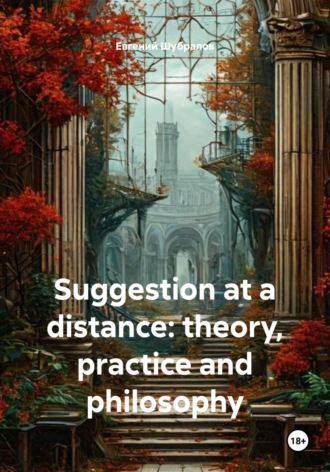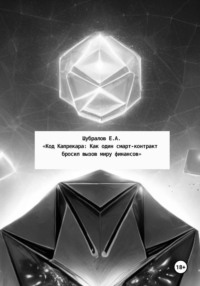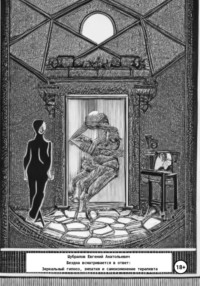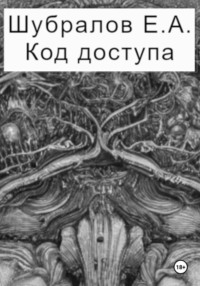
Полная версия
Suggestion at a distance: theory, practice and philosophy

Евгений Шубралов
Suggestion at a distance: theory, practice and philosophy
SHUBRALOV E.A.
SUGGESTION AT A DISTANCE:
THEORY, PRACTICE AND PHILOSOPHY
UDC 159.9.072.422 BBK 88.6 B87 ISSN 2222-0453 99016
SHUBRALOV E.A. SUGGESTION AT A DISTANCE: THEORY, PRACTICE AND PHILOSOPHY / Evgeniy Anatolyevich Shubralov, Moscow, IP Shubralovo E.A., 2024, 282 p. It is published as an appendix to the almanac "Ochevidnoe – Neveroyatnoe".
Table of contents
INTRODUCTION 3
THE CLASSICAL DEFINITION OF SUGGESTION 4
–– V.M. BEKHTEREV
–– DEFINITION OF SUGGESTION 4
–– SUGGESTION AND PERSUASION 12
–– SUGGESTION IN HYPNOSIS 16
–– SUGGESTION IN THE WAKING STATE 20
–– THE MEANING OF FAITH 28
–– INVOLUNTARY SUGGESTION AND MUTUAL SUGGESTION 33
–– MASS ILLUSIONS AND HALLUCINATIONS 40
–– STEREOTYPICAL DECEPTIONS OF FEELINGS AND SELF-SUGGESTION 48
–– CONVULSIVE EPIDEMICS IN HISTORY 51
–– IS IT A MENTAL SUGGESTION OR A TRICK? 57
––L.L. VASILIEV
–– BASIC CONCEPTS OF SUGGESTION AT A DISTANCE 61
–– CASES TAKEN AS SUGGESTION 78
–– EXPERIMENTAL SUGGESTION AT A DISTANCE 97
–– COMPARISON WITH THE RESULTS OF EXPERIMENTS 117
–– SEARCHES THE BEST CONDITIONS FOR EXPERIMENTS 126
–– TELEPATHIC COMMUNICATION 144
–– TELEPATHIC TALENT 157
–– PHYSIOLOGY OF SUGGESTION AT A DISTANCE 175
–– BIOLOGICAL TELECOMMUNICATION IN ANIMALS 189
–– THE ELECTROMAGNETIC HYPOTHESIS OF SUGGESTION 202
–– EXPERIMENTS AT A VERY LONG DISTANCE 216
–– POSSIBLE PRACTICAL APPLICATION 232
––E.A. SHUBRALOV
DEFINITION OF SUGGESTION AT A DISTANCE 245
ANALYSIS OF A CLASSICAL SUGGESTION SESSION 275
THE HYPOTHESIS OF THE AUTOGENIC NATURE OF SUGGESTION 277
FORMATION OF A METHODOLOGY BASED ON HYPOTHESIS 279
TRAINING OF SUGGESTION SKILLS AT A DISTANCE 282
The phenomena of telepathy cannot be questioned. Not only has a huge amount of relevant factual material accumulated, but almost every family member who has lived will not refuse to report personally experienced telepathic phenomena. An attempt to explain them from a scientific point of view is honorable.
K. E. Tsiolkovsky
Introduction
I was prompted to write this work by the results of more than twenty–five years of research in the field of suggestion and, in particular, the main question of philosophy, in relation to suggestion – what is primary in the phenomenon of suggestion – the reaction of the suggestible or the reaction of the suggestive?
The materials of this book in terms of describing the nature of the phenomenon of suggestion are mostly borrowed from the book by V.M. Bekhterev "Suggestion and its role in public life", with the author's comments related to the phenomenon of suggestion in reality without the use of any suggestion techniques in a state of hypnosis.
The materials of this book regarding the description and research of the phenomenon of suggestion at a distance are mostly borrowed from L.L. Vasiliev's book "Suggestion at a distance".
The materials of the practical part of this book are the quintessence of the results of the author's own research with comments and explanations.
All interested readers can continue practical training in the skills of suggestion in reality at seminars conducted by the author. You can sign up for such seminars, as well as ask questions or make suggestions by e-mail 2203827@mail.ru
THE CLASSIC DEFINITION OF SUGGESTION
It is obvious that the essence of suggestion lies not in one or another of its external features, but in the special attitude of the suggested to the "I" of the subject during the perception of suggestion and its implementation.
Generally speaking, suggestion is one of the ways in which some persons influence others, which is performed intentionally or unintentionally by the influencing person and which can occur either unnoticed by the person being suggested, or even with his knowledge and consent.
To clarify the essence of suggestion, we must keep in mind that our perception can be active and passive. In the first case, the "I" of the subject necessarily participates, which directs attention, in accordance with the course of our thinking and the surrounding conditions, to certain external impressions. The latter, entering the psychic sphere with the participation of volitional attention and assimilated through reflection and reflection, become the property of personal consciousness or our "I".
This kind of perception, leading to the enrichment of our personal consciousness, underlies our views and beliefs, since the further result of active perception is the work of our thoughts, leading to the development of more or less solid beliefs. The latter, entering into the content of our personal consciousness, can temporarily hide in the so-called subconscious sphere or in the sphere of general consciousness, but in such a way that every minute, at the will of the "I", they can be revived again by reproducing the experienced ideas.
But in addition to active perception, we perceive much of the surrounding world passively, without any participation of our "I", when our attention is occupied with something, for example, when focusing on a thought, or when our attention, due to one reason or another, is weakened, as is observed, for example, in a state of distraction.
In both cases, the object of perception does not enter the sphere of personal consciousness, but penetrates into those areas of our soul that we can call general consciousness. This latter is to a certain extent independent of personal consciousness, so that everything that enters the sphere of general consciousness cannot be arbitrarily introduced into the sphere of personal consciousness by us. Nevertheless, under certain conditions, the products of general consciousness can and do enter the sphere of personal consciousness, and the source of their initial origin is not always even recognized by personal consciousness.
A number of heterogeneous impressions entering the psychic sphere during passive perception without any participation of attention and penetrating directly into the sphere of general consciousness, in addition to our "I", form those elusive for ourselves effects of the surrounding world that affect our well-being, often giving it one or another sensual tone, and which are the basis unclear motives and motives, which we often experience in both cases.
The sphere of general consciousness generally plays a special role in the mental sphere of each person. Sometimes an impression, perceived passively, then enters, thanks to an accidental concatenation of ideas, into the sphere of personal consciousness in the form of a mental image, the novelty of which amazes us. In some cases, this image, taking plastic forms, arises in the form of a special inner voice resembling an obsession, or even in the form of a dream or a real hallucination, the origin of which usually lies in the sphere of products of the general consciousness. When personal consciousness weakens, as we observe in dreams or in deep hypnosis, then the work of general consciousness is put on the stage of consciousness, completely disregarding either the views or the conditions of activity of personal consciousness, as a result of which in dreams, as in deep hypnosis, everything seems possible that we cannot even and imagine it in the sphere of personal consciousness.
Thus, in order to clarify the method of suggestion, it is necessary to keep in mind the division of our mental sphere into personal and general consciousness. Personal consciousness, or the so-called "I", through the agency of will and attention, reveals a significant influence on our perception of external impressions; it also regulates the flow of our ideas and determines the performance of our arbitrary actions. Everything that enters the sphere of mental activity through the medium of personal consciousness is usually subjected to more or less criticism and processing by us, leading to the development of our views and beliefs.
This path of environmental influence on our mental sphere can be called the path of "logical persuasion", since the end result of the mentioned processing is always a conviction in us: "we are convinced of the truth, we are convinced of the benefits, we are convinced of the inevitability of one or the other," is what we can internally say to ourselves after the aforementioned processing of external impressions, perceived through our personal consciousness, has taken place in us. But regardless of that, as we have already said, heterogeneous impressions can enter our mental sphere in the absence of any attention to them, in other words, in a state of distraction, when volitional attention is absorbed by some kind of work. In this case, external impressions enter the psychic sphere in addition to our personal consciousness and, therefore, in addition to our "I". They penetrate into our psychic sphere no longer from the front door, but, so to speak, from the back porch leading directly to the inner chambers of our soul. This is what we call suggestion.
Thus, suggestion is the direct inoculation of certain mental states from one person to another. In other words, suggestion is nothing more than the intrusion into consciousness or the instilling of an extraneous idea into it without direct direct participation in this act of the "I" of the subject, as a result of which the latter in most cases is either completely or almost powerless to reject it and expel it from the sphere of consciousness, even if it is aware of its absurdity. Penetrating into consciousness without the active participation of the "I" of the subject, suggestion remains outside the sphere of personal consciousness, due to which all its further consequences occur without the control of the "I" and without a corresponding delay. Due to this, suggestion leads to the appearance of one or another obsession, to the realization of positive and negative hallucinations, or causes the development of psychologically conditioned convulsions, contracture, paralysis, etc.
There is hardly any possibility to doubt that suggestion refers precisely to the order of those effects on the mental sphere that occur in addition to our "I" and penetrate directly into the sphere of general consciousness. If it is necessary to define suggestion in a few words, then I must repeat here what I said already in the first edition of my pamphlet – "The role of suggestion in public life" (St. Petersburg, 1898):
"Suggestion boils down to the direct inoculation of certain mental states from one person to another— inoculation that occurs without the participation of the will (and attention) of the perceiving person and often even without clear consciousness on his part."
It is clear that this definition contains a significant difference between suggestion as a method of direct mental influence of one person on another from persuasion, which is always carried out only through attention and logical thinking and with the participation of personal consciousness.
Everything that enters the sphere of personal consciousness comes into relation with our "I", and since everything in personal consciousness is in strict accordance and combination with the "I" of the subject, a combination that serves as an expression of the unity of personality, it is obvious that everything entering the sphere of personal consciousness must be subjected to appropriate criticism and processing by the "I".
But it is also obvious that in addition to this method of influence acting on another person through personal consciousness, there is another method of influence in the form of suggestion acting on the mental sphere by directly instilling mental states, that is, ideas, feelings and sensations and without requiring the participation of personal consciousness and logic.
It is obvious that suggestion, unlike persuasion, penetrates into the psychic sphere in addition to personal consciousness, entering directly into the sphere of general consciousness without special processing and strengthening here, like any object of passive perception in general.
When, by suggestion, a person develops a cramp in the arm or, conversely, the arm is completely paralyzed, the question is, what determines the implementation of this suggestion? Obviously, nothing else but the direct penetration of the suggested idea into the sphere of general consciousness, which is not coordinated with the "I" of the subject, as a result of which the latter has no power over this suggestion and cannot counteract it.
But what prevents the "I" with its volitional attention from allowing suggestion to penetrate into the general consciousness? Why does it not introduce him, under the specified conditions, into the sphere of personal consciousness?
Because the will is either paralyzed by faith in the power of suggestion, or the subject cannot focus volitional attention on suggestion; therefore, it enters the sphere of general, not personal consciousness, thereby giving full scope to automatism.
Thus, if by suggestion we understood any direct influence on a person in general besides his "I" or personal consciousness, then we could identify this form of influence on us by environmental conditions with a form of passive perception that occurs without any participation of the "I" of the subject.
But by suggestion it is usually accepted to understand the effect of not all environmental conditions in general, but the effect of one person on another, which occurs through passive perception, that is, in addition to the participation of personal consciousness or the "I" of the subject, in contrast to another kind of influence, which always occurs through active attention with the participation of personal consciousness and consists in a logical a belief that leads to the development of certain views.
Lowenfeld, among other things, insists on the difference in the definitions of the process of suggestion itself (suggeriren) from its result, known as suggestion proper. It goes without saying that these are two different processes that should not be confused with each other. But, in our opinion, only such a definition can be recognized as the most appropriate and more correct, which embraces both the very method of influence characteristic of the process of suggestion and the result of this influence.
The fact is that suggestion is characterized not only by the process itself or the method of influencing the mental sphere, but also by the result of this influence. Therefore, in the word "suggest" we mean not only a special way of influencing this or that person, but also the possible result of this influence, and, on the other hand, in the word "suggestion" we mean not only the known result achieved in the mental sphere of this person, but also to a certain extent the way in which which led to this result.
As it was previously clarified, the concept of suggestion primarily contains an element of immediacy of influence. Whether the suggestion will be made by an outsider through a word or influence, or it will be made through some kind of impression or action, that is, whether we have a verbal or concrete suggestion, everywhere it does not affect by logical persuasion, but directly affects the mental sphere, in addition to the sphere of personal consciousness, or at least, without processing on the part of the "I" of the subject, due to which there is a real instillation of an idea, feeling, emotion, or one or another psychophysical state.
Similarly, those states that are known as autosuggestion and which do not require extraneous influences usually arise directly in the psychic sphere, when, for example, one or another idea has penetrated into consciousness as something ready, in the form of a thought that suddenly appeared and struck consciousness, in the form of a dream, in the form of a seen example etc .
In all these cases, mental influences that arise in addition to outside interference are also grafted onto the mental sphere directly bypassing the critical and self-aware "I" or what we call personal consciousness.
Thus, to inspire means to more or less directly inculcate ideas, feelings, emotions and other psychophysical states to the mental sphere of another person, in other words, to influence in such a way that, if possible, there is no place for criticism and judgment; by suggestion, one should understand the direct inculcation of ideas, feelings, emotions and others to the mental sphere of this person psychophysical states, in addition to his "I", that is, bypassing his self-aware and critical personality.
SUGGESTION AND PERSUASION
From the above it is obvious that suggestion and persuasion are the two main forms of influence of one person on another. Although among the methods of psychic influence of some persons on others, in addition to persuasion and suggestion, we can also distinguish between command and example, as well as advice, wishes, etc., but there is no doubt that to a certain extent both command and example act exactly like suggestion and cannot even be distinguished from it; otherwise, as an order, as well as an example, acting on a person's mind, can be quite likened to a logical conviction. So the order acts primarily by the power of fear for the possible consequences of disobedience through the consciousness of the need to comply, by virtue of the reasonableness of obedience in this case, etc. In this regard, the order acts like a conviction.
But regardless of that, the command acts at least in certain cases and directly on the psychic sphere, as a suggestion. The best example of the influence of an order as a suggestion is the command. The latter is undoubtedly a form of command, and who does not know that the command acts not only by force of fear for disobedience, but also by suggestion or instilling a certain idea. On the other hand, an example, in addition to its influence on the mind through persuasion of the usefulness of one or the other, can also act like a mental infection, in other words, by suggestion, as a completely involuntary and unaccountable imitation.
Who does not know the contagious effect of public executions? Who does not know the contagious effect of suicide?
Everyone knows, finally, the transmission of convulsive painful forms by direct imitation.
Thus, both command and example act in some cases by persuasion, in other cases by suggestion; most often they act simultaneously as both persuasion and suggestion. Because of this, they cannot be considered as independent ways of influencing some people on others, like persuasion and suggestion.
Similarly, advice, wishes, as well as other forms of mental influence of some persons on others can also act on the psyche either in the form of suggestion or in the form of persuasion, depending on the attitude of the person to whom they are expressed.
So, it is obvious that while verbal persuasion usually acts on another person by the power of its logic and immutable evidence, suggestion acts by directly instilling mental states, that is, ideas, feelings and sensations, without requiring any evidence at all and without needing logic. It acts directly and directly on the mental sphere of another person through an order or persuasion, through fascinating and excited speech, through gestures and facial expressions.
It is easy to see from here that the ways to convey mental states through suggestion are much more numerous and diverse than the ways to convey thoughts through persuasion. That is why suggestion is generally a more common factor than persuasion.
The latter can act primarily on persons with sound and strong logic, whereas suggestion acts not only on persons with sound logic, but even more so on persons with insufficient logic, such as children and commoners.
Undoubtedly, therefore, the suggestion or inculcation of mental states plays a particularly prominent role in our education, at least until the logical apparatus of the child reaches a certain degree of its development, allowing him to assimilate logical conclusions no less than the finished products of the mental work of others, assimilated through so-called mechanical memorization and imitation, in which suggestion, or mental inoculation by caregivers and others plays a significant role.
Similarly, in the ordinary class of the population, suggestion, or inoculation of ideas, plays an important role as a factor that significantly affects the worldview of individuals and even entire societies.
Anyone who has treated the people knows this well from his own experience and knows the value of logical beliefs, which, if successful, are only by slowly assimilating them, whereas suggestion in the form of persuasion or command almost always acts quickly and correctly here, of course, if they do not contradict the ingrained beliefs of the people.
The influence of the command in the troops, as we have already mentioned, is also mainly reduced to suggestion, which acts stronger than any persuasion. But even on intelligent people with well-developed logic, suggestion acts in certain cases hardly less strongly than on children and commoners, at least in such cases when it does not contradict the established worldview.
If suggestion, as it was clarified above, is nothing more than the influence of one person on another by directly instilling ideas, feelings, emotions and other psychophysical states without the participation of the personal consciousness of the person being suggested, then it is obvious that it can manifest itself most easily when it penetrates the mental sphere imperceptibly, insinuatingly, in the absence of resistance on the part of the "I" of the subject, or at least with the passive attitude of the latter towards the object of suggestion, or when it immediately suppresses the psychic "I", eliminating all resistance on the part of the latter. Experience really confirms this, since suggestion can be introduced into the psychic sphere either little by little through constant statements of the same kind and persuasion, or immediately like an imperative order.
SUGGESTION IN HYPNOSIS
Although all of the above defines the subject itself quite accurately, nevertheless it should be mentioned that we could not form a clear idea about the effect of suggestion and the spread of mental infection or contagion until the conditions necessary for the implementation of suggestion and the spread of mental infection were more closely clarified.
We were able to find out these conditions only later, along with the development of the doctrine of intentional suggestion produced in hypnosis. Just as the spread of physical infection was so recently dominated by the most vague ideas until it became possible to produce pure cultures of microbes and with their help to produce artificial inoculations of diseases, so in the matter of suggestion and mental infection there were many the most confused and unclear ideas until it became possible to study more closely conditions for the inoculation of certain mental states with the help of intentional suggestion.
Experience shows that for the most part such intentional inoculation of certain mental states succeeds best in a special state of consciousness, which we call hypnosis and which, in my opinion, is nothing more than a modification of ordinary sleep caused by certain techniques. See V.Bekhterev. Hypnosis and its significance as a medical remedy. Nervous diseases in individual observations, 1894; The therapeutic value of hypnosis. St. Petersburg, 1900.
As you know, the most diverse suggestions are easily successful in hypnosis. However, the question of whether we can inspire in hypnosis everything that we wish, still remains to be fully clarified. According to some authors, there are no boundaries at all for suggestion, others, on the contrary, hold the view that in hypnosis only what corresponds to the mental nature of a person can be suggested. Practically, the question boils down mainly to the possibility of suggesting certain crimes, and some authors were inclined to assert that a hypnotist is able to perform any crime under the influence of suggestion, whereas other authors saw in these statements only a simple fascination with laboratory crimes committed in hypnosis, rightly noting that the hypnotist is not completely devoid of consciousness and therefore when he is inspired by this or that crime, he is well aware that this crime is not a serious matter, that it is really only an imaginary crime and that all this is done only to test him and therefore he carries it out without much resistance, as an innocent joke.









